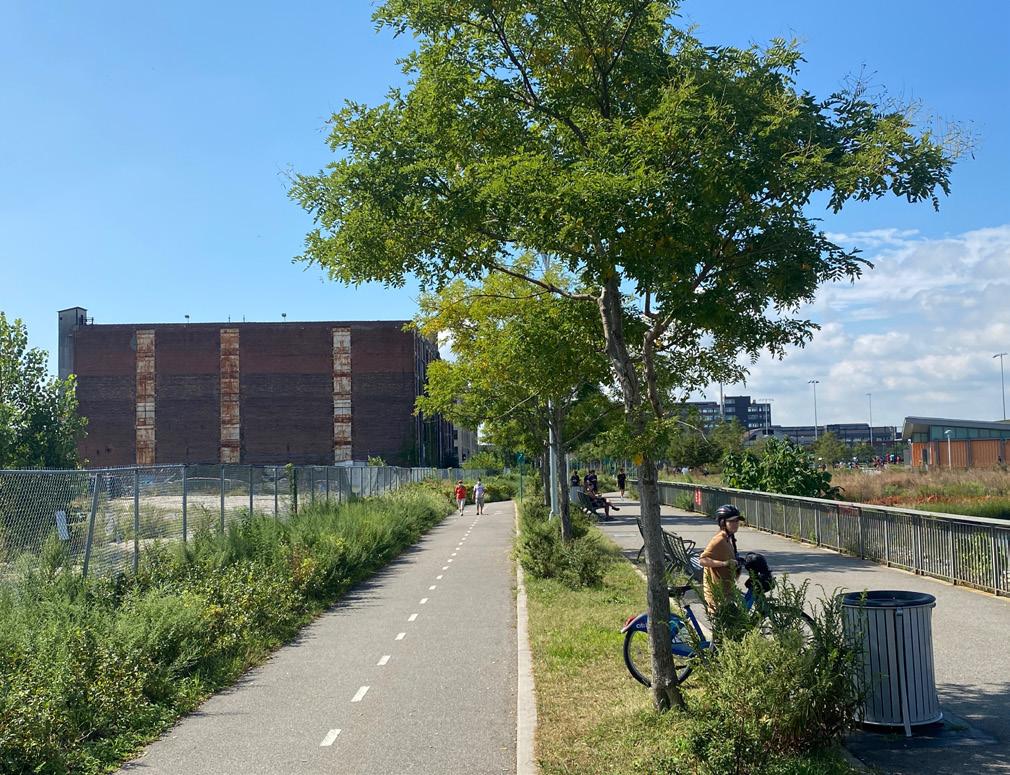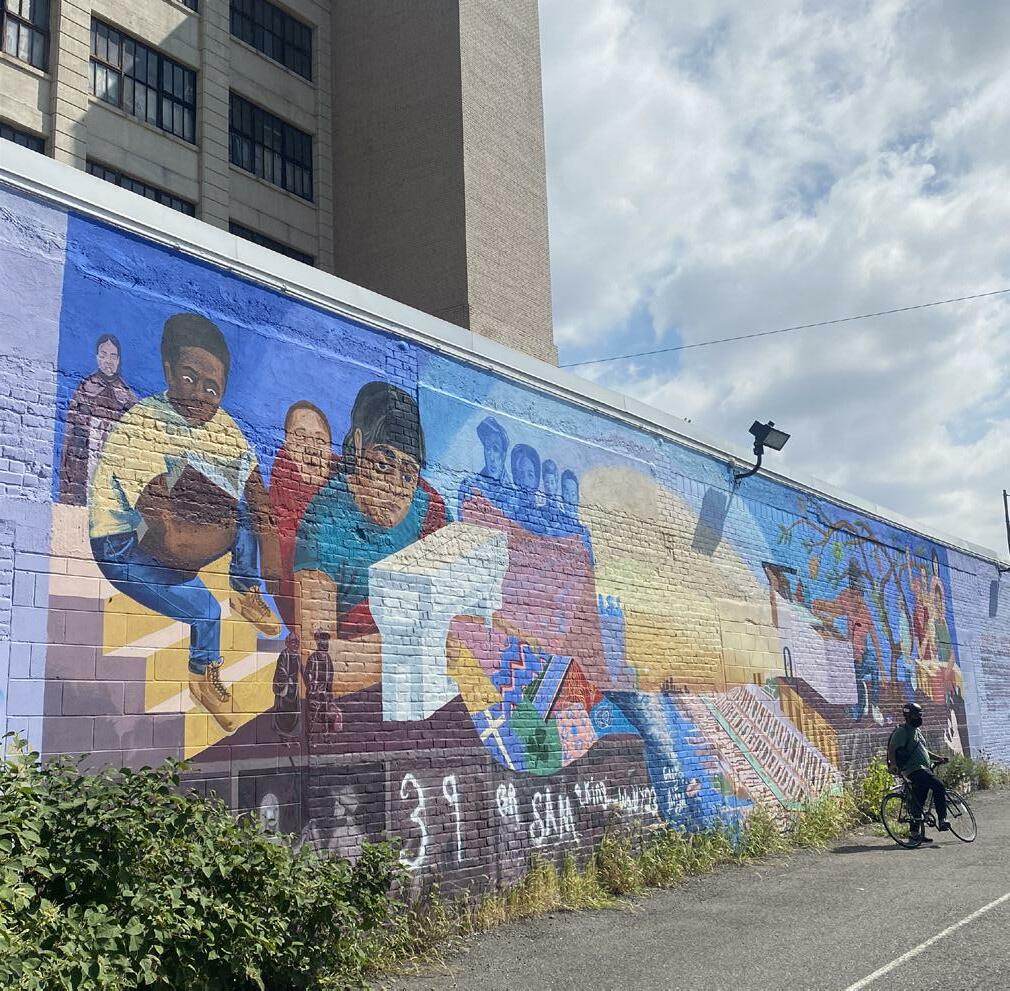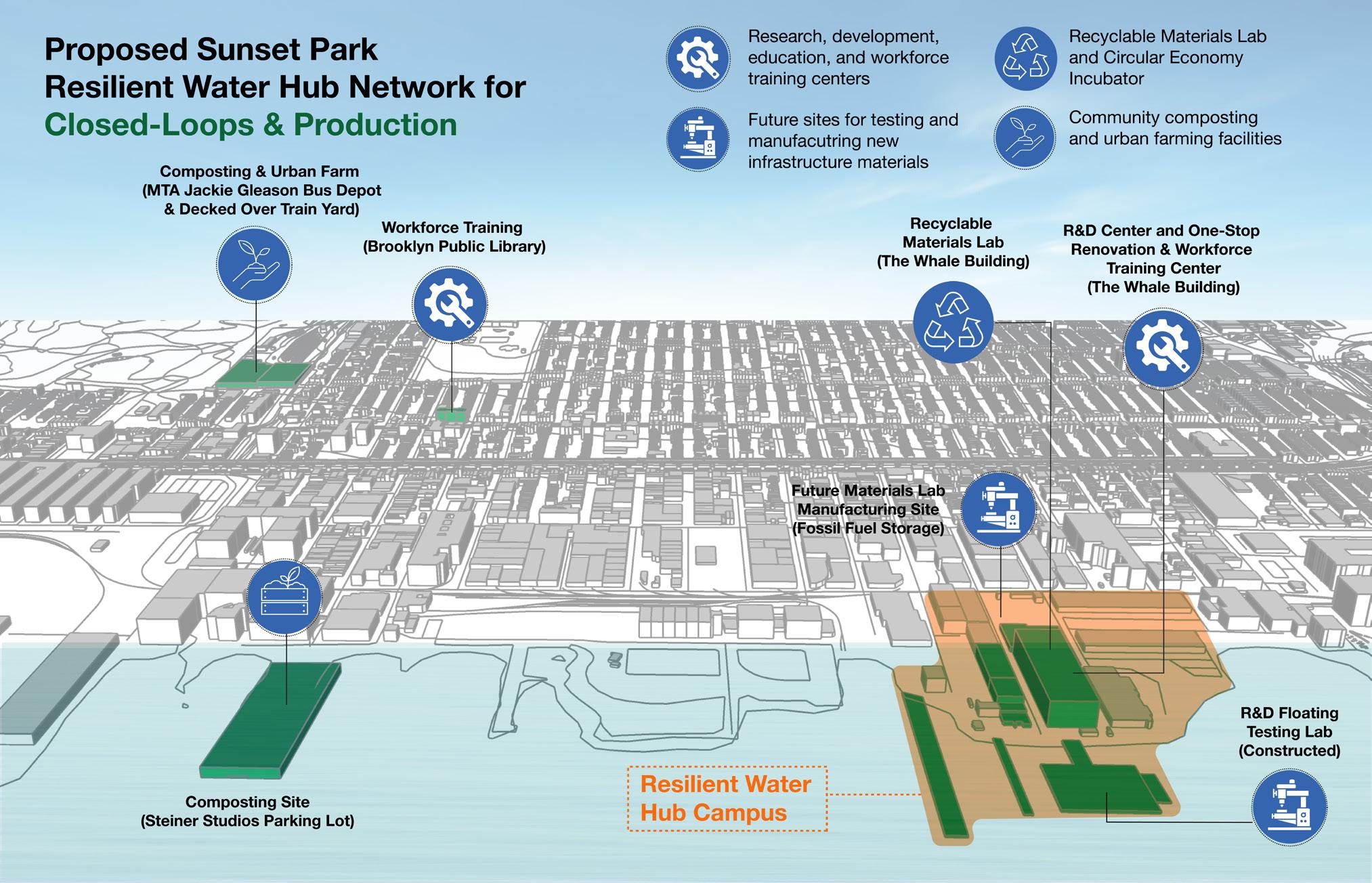
5 minute read
Towards a Just Transition for the Industrial Waterfront
by Pratt GCPE
A Partnership To Build A Regenerative Economy In Sunset Park

Advertisement
by James Tschikov
Introduction
In Sunset Park, Brooklyn, the BIWOCled community organization UPROSE has spearheaded efforts for sustainability, resiliency, and transformation through community organizing since 1966. UPROSE is a part of various coalitions in the fight for climate justice, such as the New York City Environmental Justice Alliance (NYC-EJA), the NY Renews campaign, and the national Climate Justice Alliance, a growing alliance of frontline communities.
Since 2010, Pratt’s Graduate Center for Planning and the Environment has collaborated with UPROSE in various campaigns focused on community ownership through a curricular partnership providing technical assistance. Building on UPROSE’s Green Resilient Industrial District (GRID) framework, students at Pratt GCPE participated in two studios in 2020 and 2021 to provide recommendations for sustainable visions of the industrial waterfront. Through implementation grants provided by the Kresge Foundation’s Climate Change, Health & Equity Initiative, Pratt GCPE faculty Ira Stern and Courtney Knapp have been working with UPROSE to operationalize the just transition proposals from the GRID framework and studio recommendations. I spoke with John Fleming, the Development Director of UPROSE, and Pratt faculty partners Ira Stern and Courtney Knapp to understand the scope of this work and gain insights into the future of the working waterfront in the context of climate adaptation.
THE MOMENT IS NOW: BEYOND RESILIENCY TO A JUST TRANSITION

In 2019, UPROSE successfully led a community movement to counter developer proposals for an expansion of Industry City, a retail and creative economy hub with luxury apartments on the waterfront. UPROSE argued the development of the dormant waterfront would exacerbate inequalities in this frontline community of color and reduce industrial sector jobs, which were the highest paid in the neighborhood.1 The proposal was clearly inconsistent with an equitable economic development strategy for the blue-collar labor force. Sunset Park has also long been characterized as an environmental justice community, with its concentration of heavy industrial and polluting infrastructure land uses, such as power plants and waste transfer facilities.2 Furthermore, while the neighborhood was spared by the greatest effects of Superstorm Sandy, the waterfront remains vulnerable to the impacts of sea-level rise and storms.
Considering the dueling challenges, UPROSE proposed a Green Resilient Industrial District (GRID) to envision a revitalized waterfront that preserves the industrial character of the waterfront, retains working-class jobs, supports green innovation, and promotes climate resiliency.3 With the withdrawal of the Industry City development in 2020, the GRID presented an opportunity to move beyond resiliency and resistance toward a vision for a just transition on the industrial waterfront, the Sunset Park community, and citywide. According to the Climate Justice Alliance, the principles of the Just Transition movement are based on a “vision-led, unifying and place-based set of principles, processes, and practices that build economic and political power to shift from an extractive economy to a regenerative economy.”4 The overarching goal for UPROSE is to find avenues for building community wealth through new green economy sectors.
After years of organizing, the vision is coming to fruition. In March 2022, Equinor, a Norwegian energy firm, signed an agreement with the NYC Economic Development Corporation (EDC) to build a staging and assembly ground for wind turbine components at the South Brooklyn Marine Terminal (SBMT) in Sunset Park, the first of its kind in the U.S.5 The hub is part of larger goals by New York State to bring offshore wind power capacity to 30 percent of electricity needs by 2035.6 UPROSE has been a critical partner throughout the process, as Equinor reached out to the organization earlier in the EDC proposal process to fill the space at the SBMT. Recently, Equinor pledged to create a $5 million “ecosystem fund” for workforce training and community development opportunity in the future offshore wind industry through a Community Benefits Agreement.7 With UPROSE’s decades of community organizing and coalition building, in addition to the hallmark NYC Climate Mobilization Act (CMA) and the NYS Climate Leadership and Community Protection Act (CLCPA) legislation, the moment is ripe for a just transition.
PARTNERSHIP IN ACTION: THE JUST TRANSITION WATERFRONT EXCHANGE
In my conversation with John Fleming, we discussed Pratt’s longstanding relationship with UPROSE and the challenges at hand. Fleming expressed that Pratt Institute has leadership committed to the Jemez Principles for Democratic Organizing8, which center frontline communities in their fight for climate justice. As an environmental justice organization, UPROSE has spent decades organizing against its community status as a sacrifice zone for extractive industries; however, with the principle-aligned technical expertise provided by Pratt faculty and students, the movement can shift towards operationalizing the just transition in Sunset Park.
In Fall 2021, the Pratt SES Delta Cities Coastal Resiliency (DCCR) studio was tasked with building upon proposals generated from a previous studio to develop a Resilient Water Hub on the Sunset Park waterfront, with considerations for climate adaptation to sea-level rise. Students worked with UPROSE to operationalize ideas from the just transition framework, centering community control through cooperative ownership, educational opportunities, and workforce development. The recommendations aligned with UPROSE’s mission to use community participation to bring about sustainable development with justice and accountability. The policy and design proposals would leverage the Significant Maritime Industrial Area (SMIA) to catalyze regenerative spaces, climate adaptation, and just transition practices for UPROSE’s consideration. The studio explored the hard, soft, and human infrastructure systems in Sunset Park, particularly as they relate to environmental justice concerns, such as waste management, freight, and energy systems. Students led a design charrette and community visioning workshop with Sunset Park community members and UPROSE to identify waterfront sites, integrate neighborhood assets, and develop an expansive regenerative community network.
The DCCR studio’s recommendations were integrated into the ongoing Kresge Climate Change, Health, and Equity Planning Grant to support the phased implementation of the GRID. Specifically, the proposals centered on developing sustainable production and closed-loop industries. Visions for this waterfront hub included:
• Establishing a workforce training center for building retrofits and energy industry careers;
• Activating rooftops and railyards with community-owned farms and solar systems; and

• Creating a recyclable materials lab that supports community upcycling and envisions material remanufacturing through resource recovery.
Kresge fellows Ira Stern, a professor at Pratt, and Alex Miller, a Pratt SES student, are operationalizing proposals from the DCCR studio for a new report that will identify funding sources, explore sites for implementation, and ultimately, bring the concepts to reality. The fellows are enhancing student recommendations for local food sovereignty, ecological edge opportunities, and the research labs. Stern highlighted their focus on synthesizing the workforce training and clean energy program proposals, particularly with the arrival of the offshore wind facility. The goal is to create a maritime working waterfront that will catalyze a transformative future for the neighborhood.
According to Fleming, the proposals from Pratt students are being integrated into a Just Transition Waterfront Exchange, which will be shared publicly in 2023. UPROSE’s partnership with NYC EDC has resulted in the establishment of the Sunset Park Regenerative Economies Industrial Ecosystem Development Initiative to study the economic opportunities for Sunset Park related with the CMA and Local Law 97.9 Furthermore, just transition efforts have received federal appropriation funding from Congresswoman Nydia Velazquez, who represents the district.10 “The key is outlining the pathways for the most marginalized in this community into the job opportunities that will emerge in the clean energy economy,” Fleming emphasized.









